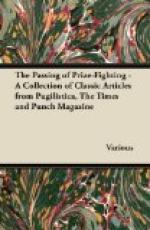A week ago the Peers decided by a very small majority—28 to 23—that there should be no Minister of Mines, but only an Under-Secretary. Lord PEEL now sought to induce them to change their minds. His principal argument was that a Minister would only cost five hundred pounds a year more than a Secretary and would secure the “harmony in the coal-trade” now so conspicuously lacking. The Peers evidently thought this too good to be true, for they proceeded to reassert their previous decision by 48 to 23.
[Illustration: A DISTINGUISHED STRANGER.
M. KRASSIN CONTEMPLATES THE COMMONS.]
There was a big assemblage in the Commons to hear the PRIME MINISTER’S statement on Poland. The Duke of YORK was over the Clock, flanked by the Archbishop of CANTERBURY on one side and Messrs. KAMENEFF and KRASSIN (who sound, but do not look, like a music-hall “turn”) on the other.
Some facts bearing, more or less, on the situation were revealed at Question-time. Mr. CHURCHILL denied that he had ever suggested an alliance with the Germans against Bolshevism, and, as we are keeping the Watch on the Rhine with only thirteen thousand men—just three thousand more than it takes to garrison London—perhaps it is just as well. He has, I gathered, no great opinion of the Bolshevists as soldiers. In his endeavour to describe the disgust of our troops in North Russia at being ordered to retire before “an enemy they cordially despised” he nearly dislocated his upper lip.
For two-thirds of his speech the PRIME MINISTER was the sober statesman, discussing with due solemnity the grave possibilities of the Russo-Polish crisis. The Poles had been rash and must take the consequences. We should not help them unless the Bolshevists, not content with punishment, threatened the extinction of Poland’s independence.
Then his mood changed, and for a sparkling quarter of an hour he chaffed the Labour Party for its support of the Soviet Government, an unrepresentative self-appointed oligarchy. To make his point he even sacrificed a colleague. LENIN was an aristocrat, TROTSKY a journalist. “In fact”—turning to Mr. CHURCHILL—“my right honourable friend is an embodiment of both.”
A brief struggle for precedence between Mr. ASQUITH and Mr. ADAMSON ended in favour of the EX-PREMIER, who doubted whether the best way to ensure peace was to attack one of the parties to the dispute, and proceeded to make things more or less even by vigorously chiding Poland for her aggression. Mr. CLYNES, while admitting that the Labour Party would have to reconsider its position if the independence of Poland was threatened, still maintained that we had not played a straight game from Russia.
Later on, through the medium of Lieut.-Commander KENWORTHY, communication was established between the Treasury Bench and the Distinguished Strangers’ Gallery. Mr. LLOYD GEORGE read the terms offered by the Soviet to the Poles, and gave them a guarded approval.




